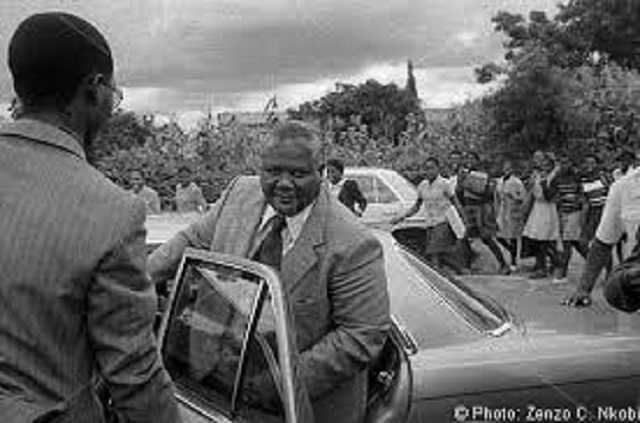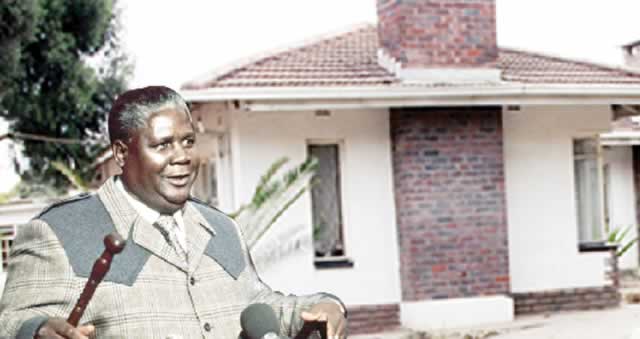Nkomo’s emotional farewell

Dumisani Sibanda, Chronicle Correspondent
It’s a Saturday morning in 1999, in July, and naturally a bit chilly.
A blanket of sadness, call it melancholy, has enveloped the City of Kings.
Most events have been cancelled and for the Sunday News newsroom like any other paper worth its salt in Zimbabwe is planning around the funeral of Father Zimbabwe, Dr Joshua Nkomo, who is one of the founding fathers of this nation.
I am assigned to cover the start of proceedings relating to Father Zimbabwe’s funeral at a local parlour and come back to the office before the main event of that leg in the afternoon.
This is basically, a cameo role, that I have been asked to play and the much more senior reporters of the newsroom, Paul Mambo, the late Editor of the Sunday News and Sifanele Ndlovu, the late Magazine Editor of the Sunday News, have been assigned what will probably be an emotional goodbye to Father Zimbabwe at Barbourfields Stadium.
Ndlovu was known for her creativity which made her undoubtedly one of the best feature reporters in the region.
On a good day, if the creative juices were flowing, she could pen a masterpiece and she being from Kezi she would jokingly boast that she was Dr Nkomo’s “home girl” and therefore there was no way she could not be at the main event here in Bulawayo.
Sadly, she passed away, years later, at a time when she was drafting a feature, which was a historical re-creation of what Bulawayo was like when it was King Mzilikazi’s capital, where the inxwala festival would take place and so on.
One of her sources of information on that particular piece was the ever reliable and helpful historian, Phathisa Nyathi.
I am with one of the senior but humble and polite photographers, Zibusiso Ndlovu, he is late now and a driver.
As we mingle with the people who had come at the parlour for Umdala, and reflecting informally on the life of Dr Nkomo, I hear Dr Nkomo’s former personal assistant, a minister then and now, Cde Simon Khaya Moyo shouting “big man” in my direction and on account of my size there is no prize for guessing who he is referring to.
“We are now going around Bulawayo and will pass through Umdala’s house in Pelandaba,” he said.
I quickly inform the photographer Ndlovu, there was also another local photographer, I think for the AP or some other agency.
There is no time to go back to the newsroom and inform them of the change of plans.
We jump into the back of the open truck to have a vantage view of the proceedings as the cortege snaked its way around Bulawayo.
People in various suburbs, starting with Makokoba, the home of Stanley Square, a venue of nationalist politics in the liberation struggle, wave goodbye after rushing out of their houses after hearing the noise as horns of cars, part of the cortege, honke.
Some people wept as they waved their hands in characteristic Nkomo fashion, “Ziiii”, some chanted and the older ones who were probably youths during the Zhii era in 1960s reminisced those bitter days of the struggle to overthrow colonialism.
I remember the cortege getting to Nkomo’s house in Pelandaba and Sibangilizwe, Father Zimbabwe’s son, saying some words in true African tradition, near the hearse, the elders who were next to me explained he was performing an African tradition announcing the arrival at Dr Nkomo’s old house.
I had never been inside the house but would pass through admiring it and wishing when “I grow up”, I would build one like his, as a small boy growing up in Lobengula Extension.
If I get educated like Father Zimbabwe, I should be able to buy one.
The belief, then I had was that “education is an infallible avenue of social mobility, leading to an escape from poverty, social degradation and ignorance”.
I had even been told by older boys while playing the plastic ball at the site where Lobengula Secondary School that Nkomo’s house had an underground tunnel which led to four houses away so much that if the colonial forces tried to surround and capture him they would have failed.
I have never asked Sibangilizwe – whose name has a political ring to it as it means “We are fighting over the country”, if that security aspect of the house was true or something we were making up as small boys corrupted by television in our James Bond style of thinking.
The cortege proceeded and it was a story of praises and shedding of tears as Bulawayo and indeed Matabeleland bade Father Zimbabwe farewell.
Most remembering his trademark fur hat which he wore and his “magical stick” always at hand and his serious warm disposition occasionally spiced by his jokes.
His humility, which would see him buy at the local shop Ko Amangwe in Pelandaba high density suburb which was owned by Ndiweni — the father of the current Chief Nyangazonke – who also grew up in the township, was obviously fondly remembered.
By the time, I got to the newsroom, news had already filtered there that Nkomo’s cortege had gone around the city and the Editor immediately called me into her office and I explained what had happened and asked me to write a descriptive piece.
I gave it my best shot and she edited it and voila as the French would say, I had produced a lead story for The Sunday News on Vice-President Nkomo’s emotional farewell from off from Byo.
He was taken to Harare where he was laid to rest after living a life of sacrifice and suffering but made sweet by his Christian values of forgiveness, unity, respect for the sanctity of life and non-racial, non-tribal approach to life which made him at peace with himself.
As we celebrate his 17th anniversary, let us re-dedicate our lives to making Zimbabwe, the country whose independence Father Zimbabwe fought so gallantly for, is a better place to live in than he left it.
Rest In Peace Ka Nyongolo.










Comments